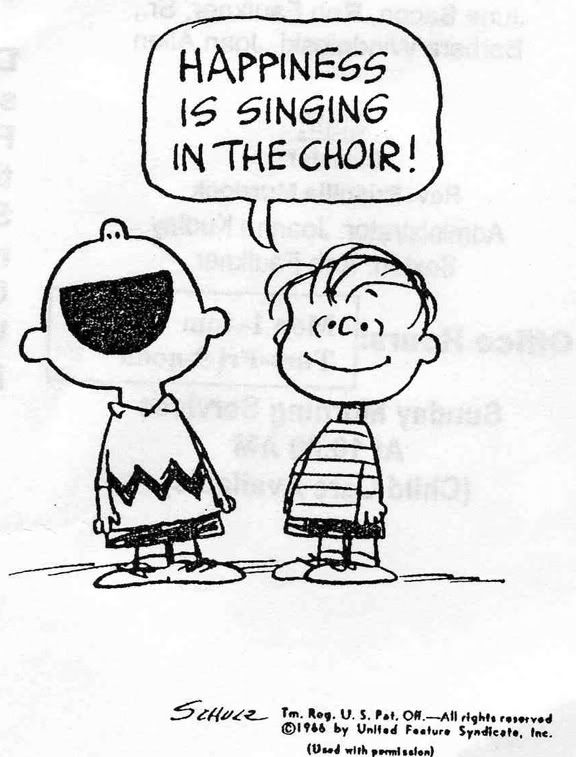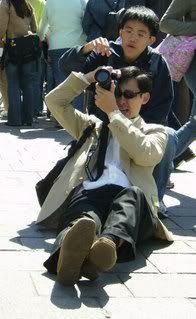Thursday, June 15, 2006
Songs INFO!! =)
Hey people, thought you guys would like to know more about the songs we put in so much effort for! hope you take the time to go read the stuff kay...took me effort to research =)) love u guys! =)
On the Miyako Islands, there is a group dance called Kuicha. The term kuicha refers to songs sung with the harmony of voices from a large group of people. This dance is performed to ensure a bountiful harvest, to pray for rain, at housewarming parties and banquets. Kuicha is performed by groups of men, groups of women and groups composed of both men and women. In whatever form it is danced, a circle of dancers is formed and with half the group alternating singing duties, they clap hands and stamp their feet or wave their hands over their heads, dancing exuberantly with their whole bodies. --found this excerpt online heh..
Libera Me is a part of the Requiem Mass of the Roman Catholic Church, as such it is in Latin. These are the lyrics. Libera Me
Libera me, Domine, de morte aeterna
in die illa tremenda
quando coeli movendi sunt et terra,
dum veneris judicare saeculum per ignem. Tremens factus sum ego et timeo,
dum discussion venerit atque venture ira:
quando coeli movendi sunt et terra. English Translation:
Deliver me, O Lord, from eternal death
on that awful day
when the heavens and earth shall be shaken
and you shall come to judge the world by fire. I am seized with fear and trembling
until the trial is at hand and the wrath to come:
when the heavens and earth shall be shaken. "Verbum Supernum Prodiens"The first line of two hymns celebrating respectively the Nativity of Christ and the Institution of the Holy Eucharist. The hymnologist Daniel remarks on the obvious relation between the Nativity and the Eucharist "by which through all ages the Word made Flesh will dwell among us" as justifying the similar forms of the two hymns (Thesaurus, I, 254).
The Nativity HymnIn its unrevised form the second line was: "A Patre olim exiens". The correctors of the Breviary under Urban VIII changed it into its present Breviary form: "E Patris aeterni sinu". Sometimes ascribed to St. Ambrose or to St. Gregory the Great, its authorship is unknown. Mone supposed it to be of the second half of the fifth century; but although Advent may possibly date back that far, the hymn is probably much later. From the tenth century it has been the usual hymn for Matins, although given in a few manuscripts to Lauds. Originally the hymn was rhymed throughout in couplets (with one exception). The revision under Urban VIII left not a single strophe unchanged, in the removal of its many unclassical prosodic features.
Exultate justi, in Domino
Hans Leo Hassler (1562-1612)
hear 1 version:
http://www.sfbach.org/tracks/ceremonies3.mp3heard 2nd:
http://www.marquette.edu/chorus/sounds/exultate.mp3Original TextExultate justi, in Domino;rectos decet collaudatio.Confitemini Domino in cithara;in psalterio decem chordarum, psallite illi.Cantate ei canticum novum;bene psallite ei in voci feratione.Quia rectum est verbum Domini,
et omnia opera ejus in fide.
Diligit misericordiam et judicium,
misericordia Domini, plena est terra.
English TranslationRejoice in the Lord, you righteousfor the upright is worthy of praise.Sing praises to the Lord with harp,with a psalter of ten strings.Sing to him a new song,Sing praises to him with a loud voice.For the word of the Lord is right,
and his works are done in truth.
He loves righteousness and judgement,
the earth is full of the goodness of the Lord.
Watch a filipino choir perform iddem dem malida(filipino chorale piece)at Singapore Kallang Theatre:
http://www.youtube.com/watch?v=u8QdPx0bKIsand btw, i found this
ancient RJ Chorale website.
Do we have a current one? xP
http://www.geocities.com/rjchorale/rjchorale.html
posted by ennova at 4:13 AM
[luvvv.. makes our hearts SING]
++++++




